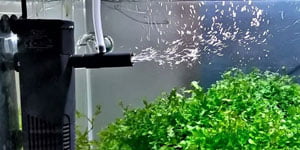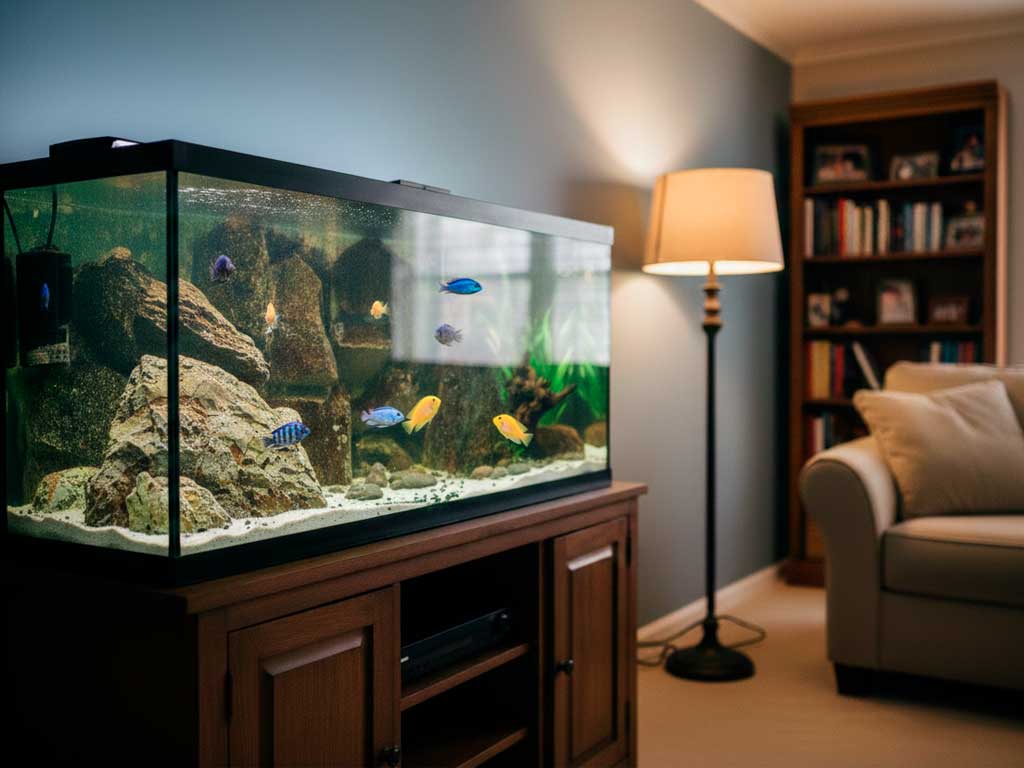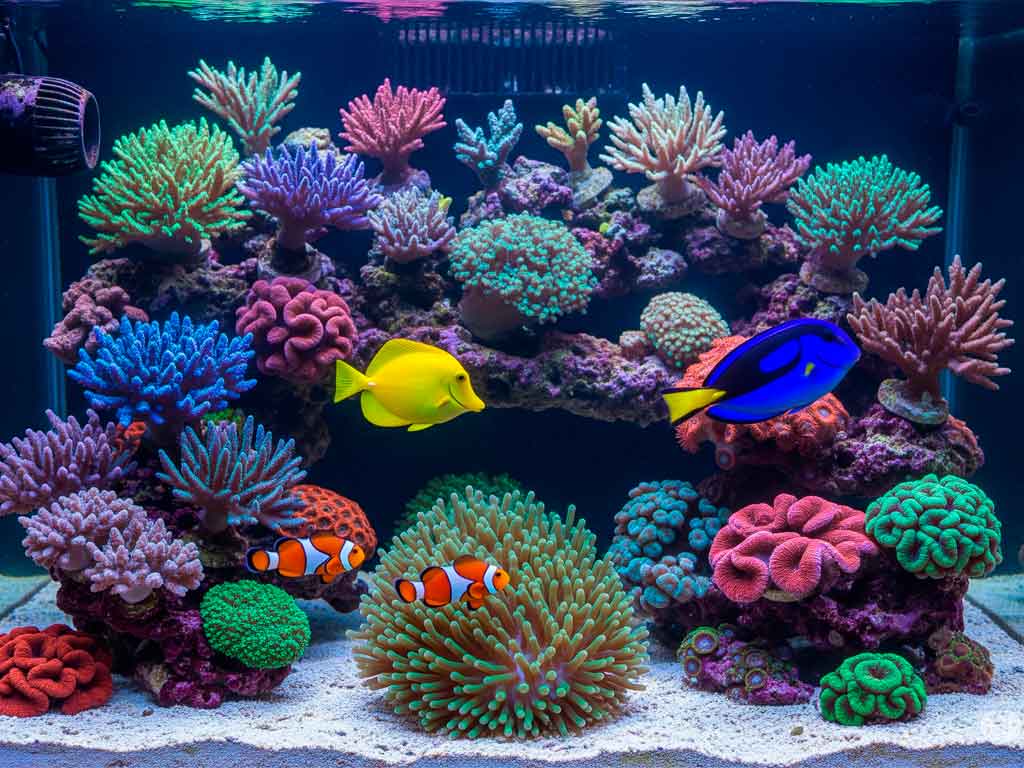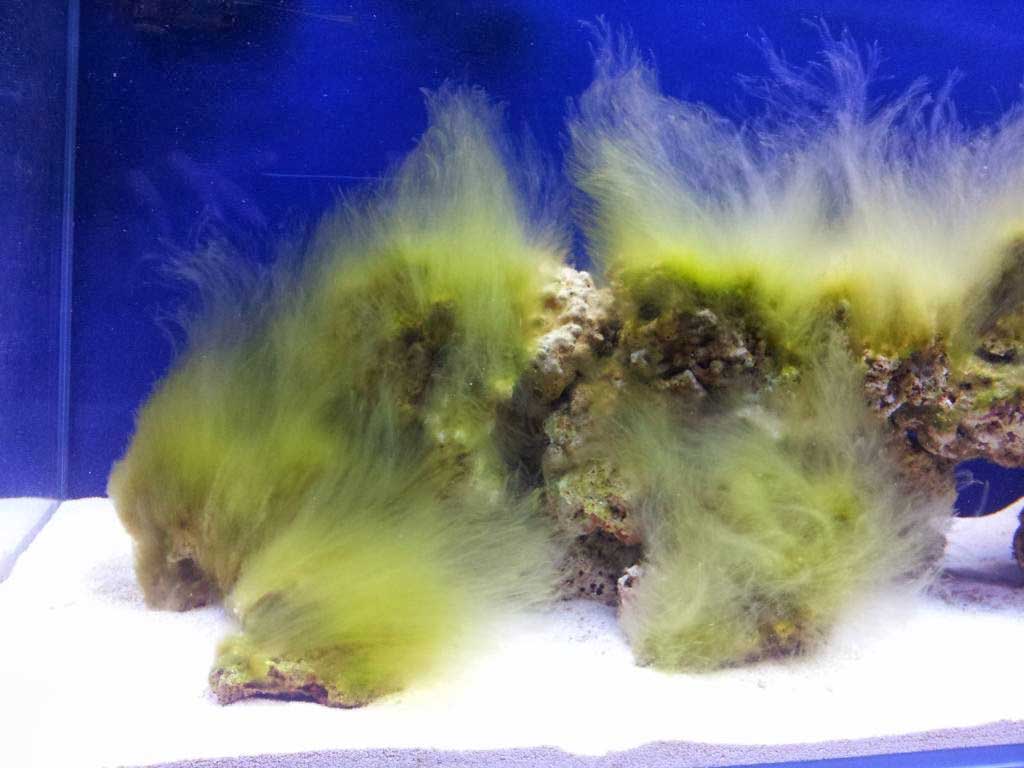Maintaining an aquarium not only involves feeding the fish and ensuring good aesthetics. Water quality is the most crucial factor for the health and well-being of all aquarium inhabitants. An efficient filtration system is essential to maintain the chemical and biological balance of the water, preventing the accumulation of harmful substances and ensuring a healthy environment for fish, plants and other organisms.
This article offers you a complete guide on the different types of filtration systems and how to choose the right one for your aquarium.
Importance of Filtration in an Aquarium
In nature, rivers and lakes provide an environment where harmful substances disperse quickly, thanks to the large volume of water and its continuous renewal. In an aquarium, the conditions are very different.
The high population density and the lack of constant water renewal make filtration essential to avoid the accumulation of waste and toxic substances. A proper filtration system ensures crystal clear water and a safe environment for aquarium inhabitants.
Types of Filter Media
There are three main types of filter media used in aquariums: mechanical, absorbent and biological.
- Mechanical Filter Media: These media are responsible for retaining dirt particles, food remains, plant pieces and other debris suspended in the water. They are made up of synthetic fibers and must be cleaned or replaced regularly to maintain their effectiveness.
- Absorbent Filter Media: They use granules that bind different harmful substances such as phosphates, silicates and medication residues. These media are crucial for adjusting specific water parameters and removing toxins.
- Biological Filter Media: They provide a settling surface for beneficial bacteria that transform and eliminate toxic substances such as ammonia, nitrites and nitrates. These media mimic natural processes and are essential for maintaining a stable biological balance.
Types of Filters for Aquariums
Depending on the size of the aquarium and the population of organisms, there are different types of filters that can be used. The main ones are internal filters, external filters and air-powered filters.
- Interior Filters: They are ideal for small aquariums. They are placed inside the aquarium and are easy to install. They can have different filter media and are suitable for aquariums with low circulation needs.
- External Filters: They are more suitable for larger aquariums. They are placed outside the aquarium and provide better water circulation through the filter media. They are most efficient for aquariums with high population density.
- Air Powered Filters: They use air to move water through the filter. They are ideal for breeding aquariums and small aquariums, where gentle circulation is preferable so as not to harm young or delicate inhabitants.
Considerations When Choosing a Filtration System
When selecting a filtration system for your aquarium, you should consider several factors:
- Aquarium Size: The inner filters are suitable for small aquariums, while the outer filters are better for large aquariums.
- Aquarium Population: An aquarium with a high density of fish will need a more powerful filtration system to handle the biological load.
- Type of Inhabitants: Some organisms, such as farmed fish or invertebrates, may require gentler filtration to avoid damage.
- Water Parameters: The choice of specific filter media may be necessary to adjust and maintain certain water parameters, such as pH, hardness, and removal of specific toxins.
Filtration Systems Maintenance
Regular maintenance is crucial to ensure the effectiveness of the filtration system. This includes cleaning or replacing mechanical filter media, regenerating absorbent media, and monitoring biological media performance. Additionally, it is important to regularly check the filter’s operation to ensure there are no blockages and that water flow is adequate.
Application Examples
- Community Aquariums: For aquariums with a variety of species, an external filter with mechanical, absorbent and biological filter media can provide the best water quality.
- Cichlid Aquariums: Cichlids are known for producing a lot of waste, so a powerful filtration system with a high biological media capacity is ideal.
- Planted Aquariums: In these aquariums, it is essential to maintain low levels of nitrates and phosphates. A filter with absorbent media specific for these nutrients can help prevent excessive algae growth.
Filtration in Freshwater Aquariums vs. Marine Aquariums
Filtration requirements can vary significantly between freshwater aquariums and marine aquariums.
- Freshwater Aquariums: These aquariums usually require less maintenance compared to marine aquariums. Biological filtration is essential, and sorbent media is primarily used to control phosphates and nitrates.
- Marine Aquariums: Filtration in these aquariums is more complex due to the high sensitivity of corals and other marine organisms to changes in water quality. Protein filters (skimmers) are common in these aquariums to remove organic waste before it decomposes. Additionally, specific filter media are used to maintain optimal levels of calcium and magnesium.
Technological Advances in Aquarium Filtration
Filtration technology has advanced significantly in recent years, providing more efficient and easier to maintain options for aquarists.
- Canister Filters: These external filters are known for their high filtration capacity and ease of maintenance. They allow the use of a variety of filter media and are suitable for large, densely stocked aquariums.
- Backpack Filters (HOB): They are popular for their simplicity and effectiveness. They are hung on the edge of the aquarium and combine mechanical, chemical and biological filtration.
- Sump Filters: Primarily used in marine aquariums, these systems provide very effective filtration and allow additional equipment to be kept outside the main aquarium, improving aesthetics and facilitating maintenance.
Benefits of High Quality Filters
Investing in a high-quality filtration system offers several long-term benefits:
- Cleaner Water: A good filtration system keeps the water crystal clear and free of harmful substances, improving the health and well-being of the aquarium’s inhabitants.
- Less Maintenance: High quality filters require less maintenance, reducing the time and effort required to keep the aquarium in optimal condition.
- Greater Stability: An efficient filtration system helps maintain a stable chemical and biological balance, which is crucial for the health of fish and plants.
- Improved Aesthetics: An aquarium with clean, clear water is more visually appealing, which improves the experience of observing and enjoying fish.
Common Errors in Aquarium Filtration
Even with a good filtration system, there are common mistakes that can affect water quality and the health of the aquarium.
- Overfeeding: Overfeeding fish produces more waste, which can overload the filtration system and cause water quality problems.
- Poor Maintenance: Failure to clean or replace filter media regularly can reduce filter effectiveness and allow harmful substances to build up.
- Undersized Filter: Using a filter that is not powerful enough for the size of the aquarium and the fish population can lead to water quality problems.
- Ignoring Water Parameters: Failure to regularly monitor water parameters, such as pH, nitrates and ammonia, can result in dangerous conditions for fish.
Tips to Optimize Filtration in your Aquarium
- Select the Right Filter: Choose a filter that is suitable for the size of your aquarium and the number of fish you have. Consider filtration capacity and ease of maintenance.
- Use Quality Filter Media: Invest in high-quality filter media that is suitable for the specific needs of your aquarium.
- Perform Regular Maintenance: Clean or replace the filter media according to the manufacturer’s recommendations and perform periodic inspections of the filter to ensure proper functioning.
- Monitor Water Parameters: Perform regular water tests to monitor pH, ammonia, nitrite and nitrate levels.
The correct choice of filter, together with regular maintenance and monitoring of water parameters, is essential to prevent the accumulation of toxic substances and maintain a balanced environment. Whether you use indoor, outdoor, or air-powered filters, understanding the specific needs of your aquarium will allow you to provide the optimal environment for your fish and plants.
Investing in a good filtration system will not only improve the health of your fish, but will also reduce the time and effort required to keep your aquarium in optimal condition, thus ensuring a rewarding and enjoyable experience as an aquarist.











